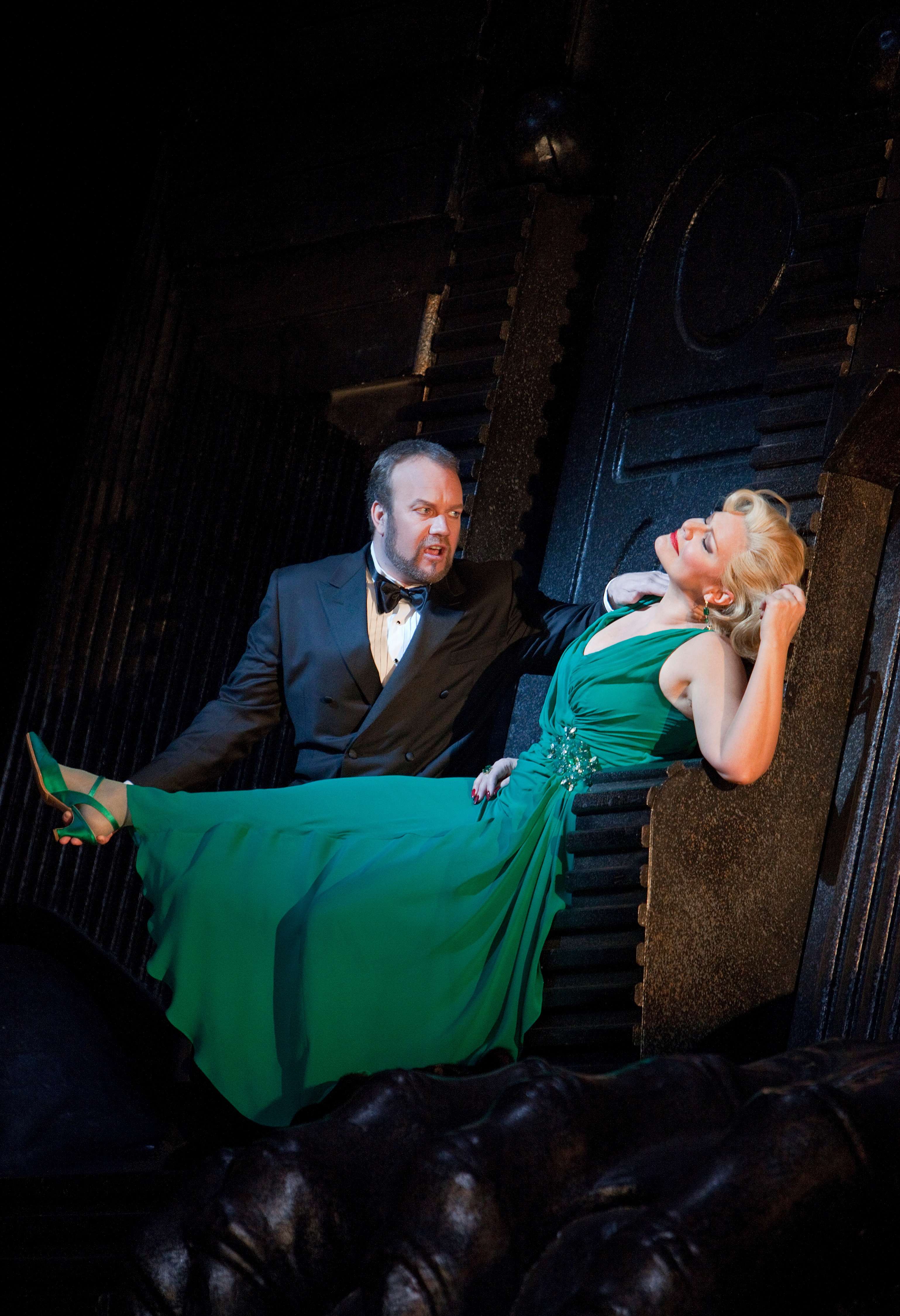|
Back
Twilight of the Immortal New York
The Metropolitan Opera
04/27/2012 - and May 1, 5, 8*, 11, 2012
Leos Janácek: The Makropulos Case
Karita Mattila (Emilia Marty), Richard Leech (Albert Gregor), Johan Reuter (Baron Jaroslav Prus), Tom Fox (Dr. Kolenatý), Alan Oke (Vítek), Emalie Savoy (Kristina), Matthew Plenk (Janek), Bernard Fitch (Count Hauk-Sendorf)
Metropolitan Opera Chorus, Donald Palumbo (Chorus Master), Metropolitan Opera Orchestra, Jirí Belohlávek (Conductor)
Elijah Moshinsky (Production), Anthony Ward (Set Design), Dona Granata (Costume Design), Howard Harrison (Lighting Design)

J. Reuter & K. Mattila (© Cory Weaver/Met Opera)
Just short of a year since the stunningly inventive production of Janácek’s The Cunning Little Vixen at Lincoln Center’s Avery Fisher Hall in 2011, the Metropolitan Opera has revived Elijah Moshinsky’s production of The Makropulos Case. Seventy years after its world premiere at the Brno National Theater, the opera came to the Met as the current production, first with Jessye Norman in 1996, and then revived in 1998 and 2001 with Catherine Malfitano as the 337-year old eternally young opera singer, Emilia Marty. This season’s performances will mark only the 19th time the opera has been seen on the Met stage. Perhaps this stinting of a modern masterpiece is due in some measure to the work’s rough start at the Met, beset as it was by a medical tragedy and then a meterological disruption. At the scheduled premiere, tenor Richard Versalle died of a heart attack while singing the role of Vítek (reputedly immediately after singing the line “you can only live so long”). The performance was, of course, cancelled. The second scheduled performance was also cancelled, this time due to a winter storm.
Revived this season as a star vehicle for Karita Mattila as a diva portraying a diva, the production shows no sign of any lingering curse, however. Matilla was magnificent as her initial flamboyant energy burned itself down to enervated ennui. She was vocally resplendent – rich toned and particularly beautiful in the middle and lower end of her range. At the top, however, there were some problems although not as acute as there were when she assumed the role of Tosca in 2009, a role she has now wisely abandoned. Her voice is much better suited to the music of Janácek. Indeed, she has mastered the rhythmic inflections of the language, which is, of course, so crucial in his operas.
Moshinky’s vision of Emilia fit Mattila’s personality, and statuesque figure down to the ground, giving her as it did ample opportunity to strut about the stage, disporting herself in full diva regalia and sexually provocative poses. She was a tough and cynical sex goddess, focused only on her quest – to procure another dose of the elixir that had rendered her immortal, and uncaring and even cynically dismissive of the cost to the men she used and abused in order to get her way. There was much humor, but of a cruel variety; men literally fell before her charms but they meant nothing.
Mattila’s Emilia was a chameleon, reliving her various incarnations (all with the initials EM) over the 337 years of her existence. Initially appearing as a woman of mystery, she visits the sterile Prague law office of Dr. Kolenatý, offering her assistance to resolve a protracted legal dispute between the families of Gregor and Prus. This byzantine case is perhaps the operatic equivalent of Dickens’ Bleak House depiction of the pointless saga of Jarndyce v. Jarndyce, a case that went on from generation to generation with the original dispute long since forgotten. Of course, Emilia’s motives are characteristically self interested; she wants the formula for the potion.
This allegorical mystery story evokes some uncomfortable modern associations. She was the involuntary victim of medical experiment – given the potion to test it out – a potion her scientist father produced for Emperor Rudolph the second, said to be desperate not to age. This quest to keep decrepitude at bay has a peculiar resonance for our time with cosmetic interventions and the public and medical view of ageing as a disease. And there is, of course, a substantial literature on the often empty promises and spiritual costs of the single minded pursuit of youth and pleasure.
Emilia’s finest operatic moment – and Mattila’s – comes at the end of the opera, Emilia gives up her quest and surrenders to death. This scene was stunningly sung and acted by Mattila – a truly transcendent star turn, holding the audience virtually transfixed.
The other singers in the cast were excellent in their supporting roles. I would single out for special mention four: Emalie Savoy made a fine Met debut as Kristina the sweet voiced ingénue who spurns Emilia’s offer to continue her immortal and immoral legacy. It was gratifying to see and hear Richard Leech again, after his prolonged absence from the Met stage. He sang the role of poor besotted Gregor with a particularly fine upper range. John Reuter sang with a dark, ample baritone in his Met debut as Prus. Bernard Fitch was a zany and ultimately pathetic Hauk-Sendorf.
Aside from Mattila, the other star of the evening was the Met’s extraordinary orchestra, under the baton of Jirí Belohlávek. Janácek’s ravishing yet challenging music was presented with élan and loving attention to its rhythmic vitality and variety and coloristic effects of the individual instrumental voices. All the suspense and eroticism of the score are to be found in the orchestra, not in the largely declamatory vocal line, albeit there were occasional outbursts of lyricism and, of course, the extended lyrical aria for Emilia at the end of the opera. Life without the finality of death has proven to be just a succession of meaningless seductions. And, of course, utterly exhausting.
Arlene Judith Klotzko
|